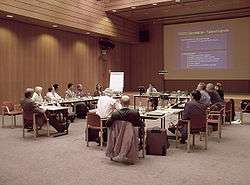Roundtable on Sustainable Palm Oil
 | |
| Abbreviation | RSPO |
|---|---|
| Formation | April 2004 |
| Type | Non-governmental |
| Headquarters | Geneva and Kuala Lumpur |
Secretary General | Datuk Darrel Webber |
Revenue (FY 2014) | RM27.1 million [1] |
| Website |
www |

The Roundtable on Sustainable Palm Oil (RSPO) was established in 2004 with the objective of promoting the growth and use of sustainable oil palm products through credible global standards and engagement of stakeholders. The seat of the association is in Zurich, Switzerland, while the secretariat is currently based in Kuala Lumpur with a satellite office in Jakarta. RSPO currently has 3,659 members from 92 countries.[2]
Criticisms
The RSPO has been criticised by various sectors, especially the environmental NGOs. Issues include the impact of palm oil plantations on the orangutan population; destruction of tropical forest for the new oil palm plantations; the burning and draining of large tracts of peat swamp forest in Kalimantan, Indonesia. The fact that RSPO members are allowed to clear cut pristine forest areas, when there are large areas of grasslands available in Indonesia,[3] raises doubts about commitment to sustainability.[4] In 2013, the 11th annual RSPO meeting was crashed by palm oil workers and others,[5] and Indonesian and international labour-rights groups have documented a litany of abuses, including forced labour and child labour. A 2013 study uncovered "flagrant disregard for human rights at some of the very plantations the RSPO certifies as 'sustainable'".[6]
The RSPO's pace of progress has drawn considerable negative attention. The organization is currently revising its core Principles and Criteria, only now after five years with the current set, to include a clear standard on deforestation of high conservation value forests,[7] and it took until 2017 to develop a clear Smallholder Standard.[8] The History & Milestones section of the RSPO's web site marks no additional progress since 2014.[9]
World Wildlife Fund (WWF)
The WWF released in 2009 a Palm Oil Buyer's Scorecard.[10] The website stated in 2010:[11]
Clearing for oil palm plantations threatens some of the world’s greatest forests, endangered species such as orangutans, and puts forest-dwelling people at risk. But with better management practices, the palm oil industry could provide benefits without threatening our some of our most breathtaking natural treasures...
Reaching those objectives requires a common language for industry, environmental and social groups to work together. Through the Roundtable on Sustainable Palm Oil (RSPO), WWF has helped to establish a platform for these parties to collaborate towards the production of sustainable palm oil. Thanks to the RSPO, sustainable palm oil is now on the market. By applying stringent production criteria to all stages of palm oil manufacture, some companies are proving that oil palm plantations need not flourish at the expense of rainforests. But so much more remains to be done. Too many palm oil producers still ignore the destructive impacts of palm oil plantations, contributing to biodiversity loss and social unrest and more companies that buy palm oil need to switch to using certified sustainable palm oil in their products.
WWF continues to monitor the palm oil industry.[12]
Other Roundtable initiatives
Similar initiatives have been established for other sectors including: Roundtable on Sustainable Biofuels, Roundtable on Sustainable Biomaterials,[13] Roundtable on Sustainable Forests,[14] Roundtable on Sustainable Development,[15] Roundtable on Responsible Soy,[16] and Roundtable for a Sustainable Cocoa Economy.[17]
See also
References
- ↑ "RSPO Treasurer's Report" (PDF). RSPO.org. p. 3. Retrieved 2014-12-29.
- ↑ "About Us".
- ↑ Murniati (2002). "From imperata cylindrica grasslands to productive agroforestry". Tropenbos International. Retrieved 2013-08-04.
- ↑ "Environment - Bumitama Agri Ltd". Bumitama Agri. Retrieved 2013-08-04.
- ↑ Eric Gottwald (14 November 2013). "Workers Give Message to RSPO: Don't Certify Abuse!". Labor is Not a Commodity. International Labor Rights Forum. Retrieved 15 November 2013.
- ↑ "Empty Promises: RSPO Labor Case Studies". International Labor Rights Forum. 14 November 2013. Retrieved 15 November 2013.
- ↑ "ANNOUNCEMENT 2ND PUBLIC CONSULTATION - RSPO P&C". www.rspo.org. Retrieved 2018-09-23.
- ↑ "PUBLIC CONSULTATION - RSPO SMALLHOLDER STANDARD". www.rspo.org. Retrieved 2018-09-23.
- ↑ "About us". www.rspo.org. Retrieved 2018-09-23.
- ↑ "WWF - Scoring palm oil buyers in Europe". Panda.org. Archived from the original on 2009-12-31. Retrieved 2011-07-25.
- ↑ "What is WWF doing about conversion of forests for palm oil?". World Wildlife Fund. Archived from the original on 2010-03-03.
- ↑ "Palm Oil | Industries | WWF". World Wildlife Fund. Retrieved 2013-08-04.
- ↑ "RSB Roundtable on Sustainable Biomaterials | Roundtable on Sustainable Biomaterials". Retrieved 2013-08-05.
- ↑ Daniel Swensen. "Roundtable on Sustainable Forests". Sustainableforests.net. Retrieved 2013-08-05.
- ↑ "RTSD". Oecd.org. Retrieved 2013-08-05.
- ↑ "Round Table on Responsible Soy Association". Responsiblesoy.org. 2011-06-21. Retrieved 2013-08-05.
- ↑ "Roundtable for a Sustainable Cocoa Economy: TOWARDS A SUSTAINABLE WORLD COCOA ECONOMY". Roundtablecocoa.org. 2009-02-12. Retrieved 2013-08-05.
External links
- Official website
- Palm Oil - Production, Consumption, Exports, and Imports Statistics by Country
- Are emission reductions from peatlands MRV-able?
- The impacts and opportunities of oil palm in Southeast Asia: What do we know and what do we need to know? (2009).
- FAQ: Palm oil, forests and climate change.
- What is the Roundtable on Sustainable Palm Oil? | Visual.ly
- Profile : Roundtable on Sustainable Palm Oil.
